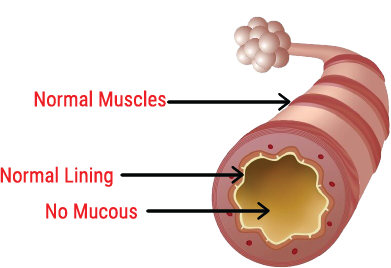- Lung Care Foundation
- 011 - 4225 2328
- lung@lcf.org.in
- Home
- About Us
- Our Initiatives
- Air Pollution
- Lung Basics
- Patient Support
- Get Involved
- Media
- Contact Us
Asthma
- Home
What is Asthma
Asthma is a chronic (lifetime) disease and also life-threatening in which your lungs and airways (breathing passages) become extra sensitive due to the exposure to the things in the environment every day.
According to the statistics shared by WHO it was found that, in India, among the 1.3 billion population, 6% children and 2% adults suffer from asthma. Whereas, considering worldwide around 339 million have asthma.
Normal Airways

Asthmatic Airways

How does it affect your breathing ?
In asthma, certain irritants trigger the muscles around your airways to tighten, making your airways swell and causing a build-up of mucus. With narrow airways, it’s harder to get air in and out of your lungs and thus making it difficult for you to breathe.
Causes
- Genetic- Family history of allergies
- Allergic conditions like allergic rhinitis and atopic dermatitis (eczema)
- During infancy or early childhood, any respiratory infections can impact lung function in long-term
- Bronchiolitis- an early childhood lung problem
- Mother smoking during pregnancy
- A child born prematurely (before 37 weeks)
Asthma Triggers
Asthma response to different triggering factors which vary person to person:
- Pollution, smokes, and fumes from vehicles, industries and chimneys
- Irritants, like tobacco smoke, spray cleaners and dust
- Allergies to things like pollen and animal fur
- Physical activity such as running, walking fast, cycling, etc.
- Dust and dust mites and pollens
- Common cold or flu
- Stress and Heightened emotions
- Certain foods to which the person is allergic to and ice drinks
Symptoms

Shortness of Breath
Feeling that you can’t get enough air into your lungs



When is it a call for an emergency?
Signs and symptoms of a serious asthma emergency:
- Struggling for breath
- Rescue inhaler doesn’t help
- Difficulty speaking, can’t finish a sentence
- Sucking in the skin above breastbone and between ribs
- Nostrils flaring out
- Pale and grey skin, sweating
- Blue lips or nail beds
- Unconscious (fainted)
Diagnosis
Asthma can start at any age. It can be during young age as their lungs develop and the symptoms go away, but it may come back later in life. Sometimes people get asthma for the first time when they are older.
Do consult a general physician if you see any of the mentioned symptoms who will perform the following tests:
1. General physical examination
Before making any diagnosis, doctor may ask you questions like:
- Family history of allergies, asthma or any medical history
- Symptoms
- When does it happen?
- Things that trigger symptoms
- Results of breathing tests if done
After a proper general examination, the doctor suggests for some tests to rule out further diagnosis.
2. Test for Asthma
There are several breathing tests your doctor may perform.
Spirometry
- The most common test, which uses a device called a spirometer, to measure how much air you can keep inside your lungs and speed of the air you blow out.
- This helps your doctor to see how well your lungs are working.
As there can be symptoms that may sound similar to other lung diseases so doctor may advise for additional tests. To measure inflammation of the lung lining, a chest X-ray may be advised by the doctor to help rule out other lung problems.
Treatment
Unfortunately, asthma can’t be cured, but if managed properly, people with asthma can lead normal active lives.
The essential step towards the treatment is to start by recognising individual’s triggers which leads to the symptoms of asthma. Further the following measures help in preventing asthma in the long run.
Inhalers
Pump or Puffer
Inhalers contain measured doses of medication that you take into your airways when you breathe in.
There are two main kinds of inhalers:
- Preventer inhalers: to protect airways and make sure your airways stay clear. It also prevents symptoms from developing.
- Inhaled corticosteroids are the most common and effective type of asthma prevention.
- Reliever inhalers: It’s basically to relieve your symptoms if they occur. You keep your rescue medicine on hand and take it only when you need it (during an asthma attack) such as if your breathing gets worse, or (sometimes) before exercising.

Medicines
The two types of asthma medicines are:
- Reliever Medicines Reliever medicines contain a medication called short-acting beta-agonists (SABAs), which relax the muscles around the tightened airways, so that more air can flow. This makes it easier to breathe and reduces your symptoms.
- Controller Medicines are used for long term control of asthma regularly. It reduces mucus and swelling production in the airway.

Management
It is important to manage asthma so that:
- You don’t have to face symptoms during day or night.
- You can do your everyday work with ease.
- You don’t have to use your inhalers (daily).
Each person’s asthma is different. You and your doctor will work together to establish the best treatment plan based on your symptoms and needs.
Asthma requires ongoing assessments and monitoring throughout your lifetime.
- Keep your doctor in contact to get your asthma under control
- Follow your written asthma action plan
- Avoid your asthma triggers: smoke, cold air, etc.
- Avoid your asthma inducers: allergies, viruses, etc.
- Use your asthma medications as prescribed
- Know what to do in an asthma emergency (asthma attack)
Questions for your Doctor
- Are there things I can change in my life to reduce my risk of an asthma attack?
- What kinds of tests will I need to monitor my asthma?
- What kind of inhalers do I need?
- How do I use an asthma inhaler?
- Is it safe to exercise with asthma?
- Does stress trigger asthma?
- Are there any side effects of the treatments?
Frequently Asked Questions (FAQs)
Asthma is a chronic (lifetime) disease and also life-threatening in which your lungs and airways (breathing passages) become extra sensitive to things that you are exposed to in the environment every day.
In asthma, certain irritants trigger the muscles around your airways to tighten, making your airways swell and causing a build-up of mucus. With narrow airways, it’s harder to get air in and out of your lungs and thus making it difficult for you to breathe.
No, not yet. However, it can be controlled, by using controller medication and by avoiding allergic and non-allergic triggers.
It seems there are more cases of asthma today because it is more correctly diagnosed than it was in the past.
That said, the overall incidence of asthma has been increasing. While researchers do not know exactly why, they do have several theories.
One theory suggests that more people develop asthma today because we spend more time indoors than people used to. Indoor air can contain a number of asthma triggers, such as smoke, dust mites and pet allergens. Additionally, in response to the oil crisis of the 1970s, modern homes are more tightly sealed than older homes. This means that indoor air doesn’t circulate with outdoor air the way it did in older, better-ventilated homes. As a result, people inside are exposed to greater amounts of indoor air and the triggers it may contain.
Other theories attempting to explain why asthma is on the rise include the suggestion that outdoor air pollution has a significant effect on asthma. There is also the possibility that because children today experience fewer infections, they are somehow more susceptible to developing asthma.
There are several factors that may contribute to your experiencing more asthma symptoms at night:
The circadian rhythm causes certain natural hormones (similar to those in certain asthma medications) to be at lower levels at night. These lower hormone levels reduce the diameter of the airways slightly and may make it more likely that you experience asthma symptoms at night.
You could be inhaling dust mite allergens from your pillows, blankets and mattress while you sleep.
When you lie down, the distribution of gravity on your chest can put extra pressure on your lungs.
If laughing or crying brings on symptoms, your asthma is not being properly controlled. Talk to your doctor or an asthma educator about ways to better control your asthma.
Asthma occurs everywhere, so moving generally will not help. Usually your house, not your geographic area, is the most important consideration for people with asthma. The home can contain triggers like old carpets full of per allergens and dust mites and mould. But, if there is one particular asthma trigger that is a big problem in your area, moving somewhere where it is low or absent may help.
Children with asthma may have a flare up when exposed to specific triggers. These may include chemicals, exercise and even the weather or air pollution. Some common triggers may be in your home, like dust mites or pet fur. Once you and your doctor have identified your child’s triggers, you can work on making your home trigger-free. This asthma triggers checklist outlines steps you can take to remove asthma triggers from your home.
Anyone who takes care of your child should know that your child has asthma. That includes teachers, coaches, the school nurse and babysitters. The easiest way to share the information they need is to show them your child’s asthma action plan and give them a copy to keep. You can also show them how to use your child’s medications. With this information in hand, your child’s caregivers can make better decisions if they need to help your child through an asthma attack.
Helping your child to understand asthma will give you peace of mind and make it easier to manage the condition. Explain asthma in language that is appropriate for the child’s age and give your child a chance to ask questions. You’ll also want to talk about medications and what to do during an asthma attack. If you’re not sure where to start, ask your child’s doctor for suggestions and resources, or ask the doctor to lead the conversation.
Milk and other foods do not generally cause asthma symptoms unless a person is allergic to them. If you do have food allergies that contribute to asthma symptoms, do not eat those foods.
If you’re told you can’t eat certain foods, it’s important to make sure you’re getting the nutrients you need from other, non-allergic products. Ask your doctor or a dietician how you can control your asthma symptoms and still enjoy a healthy, balanced diet.
Everyone benefits from some form of exercise. If exercise makes your asthma symptoms worse, it means your asthma is not well-controlled. Tell your doctor so changes can be made so that you can exercise without experiencing symptoms.
No. Poorly controlled asthma is a much greater risk to your baby. Remember, you’re breathing for two.
Most asthma medication is generally safe to take during pregnancy but, as always, you should be taking the lowest amount of medication that controls your asthma. Discuss any concerns with your doctor – he or she can explain the risks and benefits in greater detail. Keep in mind that when you’re pregnant, it’s more important than ever to avoid your personal asthma triggers as well as any source of tobacco smoke.
Never stop taking your medication unless your doctor tells you to. If you stop taking your medication against your doctor’s advice, you may make your asthma worse.
Keeping your asthma under control doesn’t just mean never having an asthma attack. Well-controlled asthma is defined as the absence of any regular symptoms. Remember, taking your medication is an important part of keeping your asthma under control, and will reduce the likelihood that inflammation will damage your lungs over time.
Most asthma medications do not prevent people from donating blood. As long as you are not experiencing asthma symptoms, you are likely able to donate.
Yes, it is worth it to try to avoid asthma triggers. Avoiding asthma triggers and recognizing when they make your symptoms worse are important to help you manage your asthma.
All Rights Reserved By LCF.ORG.IN | Privacy Policy | Terms and Conditions
Powered by: www.chillitrends.com
- Home
- About Us
- Our Initiatives
- Air Pollution
- Lung Basics
- Patient Support
- Get Involved
- Media
- Contact Us

